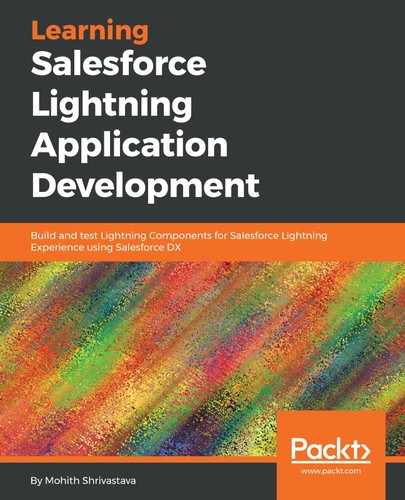The aura method discussed in the preceding section has return statements and is synchronous. Most often, when you are working with server-side code to fetch values using @AuraEnabled methods, it's asynchronous. If you use return statements, you will notice that aura methods run before the server returns the value; so, it's important to pass the function and use callback (https://developer.mozilla.org/en-US/docs/Glossary/Callback_function).
Let's demonstrate how callback works, with the help of the following example code.
Let's create a child component (we will assume it's a component API, which can be reused across various components). The controller code to fetch the contacts is as follows:
public with sharing class ContactController {
@AuraEnabled
public static list<Contact> getServerContacts(){
return [Select Id, Name, Email, Phone From Contact ORDER BY CREATEDDATE DESC limit 10];
}
}
The child component markup that calls the Apex controller code is as follows:
<!-- GetContacts.cmp -->
<aura:component controller="ContactController">
<aura:method name="getContacts"
description="Sample method with server-side call">
<aura:attribute name="callback" type="Function" />
</aura:method>
</aura:component>
Notice that the name getContacts function in the JavaScript controller has the same name as the name used in the aura:method component markup. The controller code is shown as follows, invoking the Apex controller method, getServerContacts:
/* auraMethodController.js */
({
getContacts : function(cmp, event) {
var params = event.getParam('arguments');
var callback;
if (params) {
callback = params.callback;
}
var action = cmp.get("c.getServerContacts");
action.setCallback(this, function(response) {
var state = response.getState();
if (state === "SUCCESS") {
console.log("From server: " + response.getReturnValue());
//return doesn't work for async server action call
//return response.getReturnValue();
// call the callback passed into aura:method
if (callback) callback(response.getReturnValue());
}
else if (state === "INCOMPLETE") {
// do something
}
else if (state === "ERROR") {
var errors = response.getError();
if (errors) {
if (errors[0] && errors[0].message) {
console.log("Error message: " +
errors[0].message);
}
} else {
console.log("Unknown error");
}
}
});
$A.enqueueAction(action);
},
})
The child component is almost an API for a parent component to use this. Let's assume that the parent component is a button and invokes the child component controller in an asynchronous way.
The parent component markup is as follows:
<aura:component>
<aura:attribute type="Contact[]" name="contactList"/>
<c:GetContacts aura:id="child" />
<Lightning:layout multipleRows="true" horizontalAlign="center" verticalAlign="center">
<Lightning:layoutItem flexibility="auto" padding="horizontal-small" size="8">
<aura:iteration items="{!v.contactList}" var="contact">
<Lightning:card title="{!contact.Name}">
<p class="slds-p-horizontal_small">
{!contact.Email}
</p>
</Lightning:card>
</aura:iteration>
</Lightning:layoutItem>
</Lightning:layout>
<Lightning:button label="Get Contacts From Server"
onclick="{!c.fetchContacts}"/>
</aura:component>
The controller code is as follows:
({
fetchContacts : function(component, event, helper) {
var childCmp = component.find("child");
// call the aura:method in the child component
childCmp.getContacts(function(result) {
console.log("callback for aura:method was executed");
console.log("result: " + result);
component.set("v.contactList",result);
});
}
})
The final component is as follows, fetching the contact with the email from the server:

